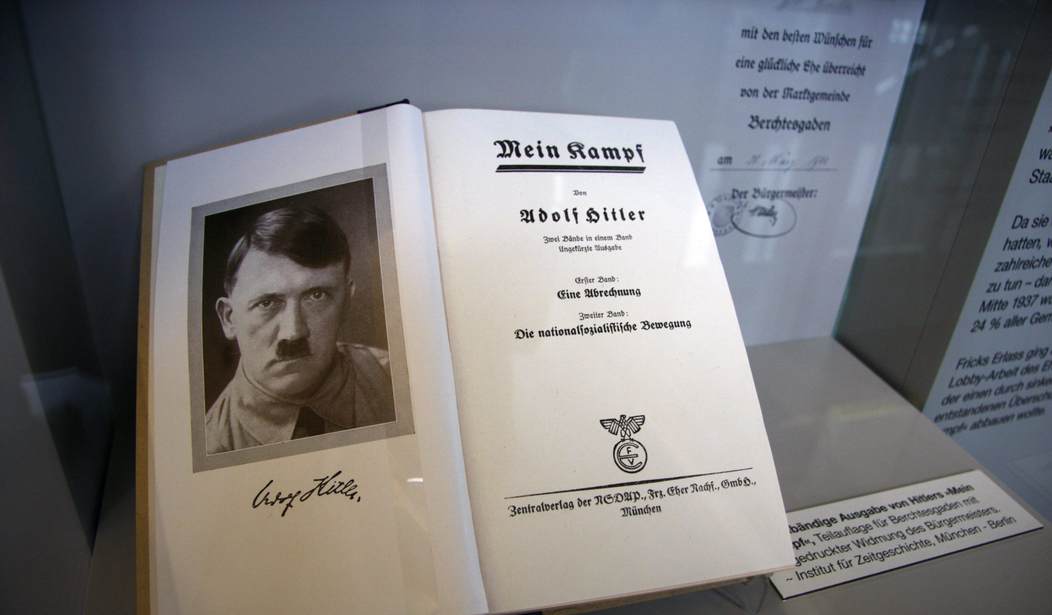Publication of Adolf Hitler’s memoir has been banned in Germany since the end of war, and the rights have been tightly controlled by the Bavarian government. But now, with the book entering the public domain, a new annotated edition is on its way to German bookstores:
Hitler’s manifesto has not been published in Germany since 1945. The government of the state of Bavaria controlled the rights of the Nazi work, but now, 70 years after the death of the dictator, the copyright expires. The Institut für Zeitgeschichte (Institute of Contemporary History) in Munich has prepared an almost 2,000-page long scholarly edition of the controversial work, which will hit the bookstores in January.
Now major booksellers are reflecting on how they will deal with the long-forbidden militaristic screed.
Hitler prepared his lengthy autobiographical work during his time in prison, after he tried to grab power in Munich in 1923 through a failed putsch. Promoting his anti-Semitic ideas, the book became popular and helped him rise to power in 1933. The royalties from the sales created a small fortune for him.
The thoughts of the leader of the National Socialist German Workers‘ Party, recorded by his faithful amanuensis, Rudolf Hess, were inscribed during Hitler’s stay in Landsberg prison for trying to overthrow the Bavarian government. As Hitler’s political fortunes waxed, the book proved to be a runaway bestseller. But now?
Now retailers are trying to determine what they will do with the revenues generated by the new edition. Online retailer Amazon has announced that it will donate the proceeds to charity, according to a spokesperson. The German bookstore chain Thalia said it is not planning to promote the book and will only order it “if a customer explicitly wishes a copy,” said a company representative.
Competing chain Hugendubel declared: “Our customers can find everything in our store that is not prohibited,” but manager Nina Hudendubel did not specify how and if the book will be on display in her stores.
Although the turgid work has long been banned in Germany, it’s available world-wide, including in Israel.
It is possible to buy reprints in almost every language – and even original copies signed by Hitler himself. Even in Israel, “Mein Kampf” can be found in book stores – in both German and Hebrew.
The Turkish edition of the book advertises it as “a classic of anti-Marxist world literature” and even reached number four on the bestseller list in 2005.
Publication has also been approved by a major Jewish organization in Germany:
The Central Council of Jews in Germany said it approves of a specially annotated version of Adolf Hitler’s notorious autobiographical manifesto, a month before the book is set to become part of the public domain. The two-volume “Mein Kampf” outlined Hitler’s political philosophy and contained numerous anti-Semitic remarks about Jews that some historians argue foreshadow the Nazi leader’s plans to eradicate the ethnic group.
Originally published in 1925 and 1926 respectively, the two volumes have not been published in Germany since the end of World War II. However, the Institute of Contemporary History in Munich said it plans to publish a critical, annotated version of “Mein Kampf” in January.
In an interview with the German daily newspaper “Handelsblatt,” Josef Schuster, head of the Jewish organization, said the publication of “Mein Kampf” could prove valuable, but also that it needed to be monitored. “Knowledge of ‘Mein Kampf’ is still important to explain National Socialism and the Holocaust,” Schuster said, referring to the political ideology of the Nazi Party and the genocide that led to the deaths of some six million Jews. He went on to say it was important that authorities prevented the spread of unannotated copies of the book.
As a window into the leftist mind, Mein Kampf is indeed a valuable teaching tool, illustrating just how awful things can get when people like Hitler force their way to power.









Join the conversation as a VIP Member